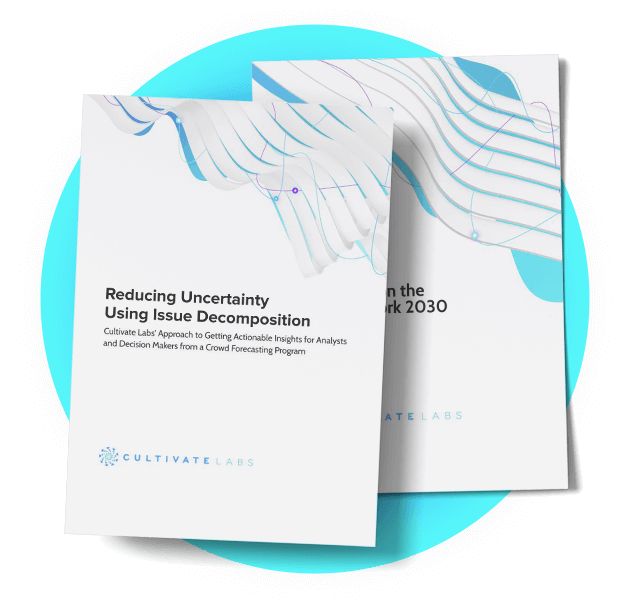Cultivate Labs Blog
Discussing how crowd forecasting, internal crowdfunding, and other new workplace trends can be used to improve the #futureofwork

Sign Up For Our Monthly Newsletter
By Ben Golden on Dec 04, 2015
Getting Started With Prediction Markets
Joining a prediction market can be confusing and anxiety-inducing. It's easy to be overwhelmed by all the questions, to not understand the forecasting interface, or to have trouble forming opinions to base forecasts on. All of this is pretty natural--as a now-experienced forecaster, I can remember these feelings the first time I joined a prediction market. In this post I'll address a few specific emotional barriers that make it difficult to start forecasting.
Read moreBy Ben Golden on Nov 23, 2015
Demystifying Unicorns Through Prediction Markets
On a recent podcast, Jack Schultz and I discussed two razor companies that are poised to become unicorn companies. Unicorns--startups that grow to billion-dollar valuations while remaining private--are somewhat mysterious and the subject of continuous speculation.
Read moreBy Cultivate Labs on Nov 19, 2015
Prediction Markets -- Beginner to Intermediate
Wikipedia’s intro paragraph for prediction markets is the following:Prediction markets (also known as predictive markets, information markets, decision markets, idea futures, event derivatives, or virtual markets) are exchange-traded markets created for the purpose of trading the outcome of events.
Read moreBy Ben Golden on Nov 16, 2015
Predict Daily Fantasy Football Leaders on SportsCast
One use of prediction markets I've been really excited about is forecasting individual players' performances in major sports. These predictions are incredibly useful when playing fantasy sports--both daily fantasy and season-long leagues--and the forecasts that currently exist tend to be, in my experience, pretty mediocre. Prediction markets present an opportunity for the wisdom of the crowds to intervene, and will likely lead to more accurate forecasts.
Read moreBy Ben Golden on Oct 13, 2015
Prediction Markets In A World Hostile To Gambling
Two key take-aways from the emerging scandal surrounding Daily Fantasy sites: one, gambling data can be extremely valuable, and two: the only thing Americans love more than gambling is hating on gambling. Taken together, these findings illustrate why large-scale prediction markets present a path towards improving human knowledge in a wide range of topics.
Read moreBy Jess Price on Oct 06, 2015
VC's should be doing this
Amongst the leadership teams of the portfolio companies at any medium to large investment firm, there is an incredible amount of experience, wisdom, and perspective that is not collectively being taken advantage of.
Read moreBy Ben Golden on Oct 05, 2015
Your Competitors Are Predictable
We recently started working with a Houston-based client in the Energy sector, who wanted to use a prediction market to help with internal operations, and to create greater transparency and communication within their company. We spent a couple months meeting with our client to learn about their business and objectives, and using test questions (e.g. asking about Houston sports teams) to help participants understand how prediction markets work. Our initial questions focused on specific operations
Read moreBy Vanessa Pineda on Oct 05, 2015
There's No Driving With a Dead Engine: The Importance of Project Sponsorship
Have you ever been tasked with driving a project you’ve felt was going nowhere? Maybe you were a project manager or project owner, coordinating a team that was working on something you felt wasn’t gaining traction within the organization.
Read moreBy Cultivate Labs on Oct 01, 2015
Superforecasting -- Everything has a base rate
Basically, we want to find the base rate of similar events occurring, and then adjusting that percentage by taking into account the differences between this event and the similar ones.
Read moreBy Ben Golden on Sep 21, 2015
Forecasting Atrocities
Holly Ramer has a piece up at the Washington Post about our work with the United States Holocaust Memorial Museum to identify risks of mass violence in different countries:
Read moreBy Ben Golden on Sep 14, 2015
Evaluating Accuracy Effect By Percentile
In my last post analyzing my own forecasting history on Inkling Markets, I showed that I was consistently identifying long-shot bets that were more likely to pay off than their existing probability would suggest. In this post, I'll look at how my forecasts improve the accuracy of these markets, calculating how many the change in component Brier score within different percentiles.
Read moreBy Ben Golden on Sep 11, 2015
Evaluating User Forecasts By Percentile
To analyze forecasts' accuracy, I looked specifically at forecasts that crossed percentile thresholds, and then examined how often the result being forecast actually occurred.
Read moreBy Ben Golden on Sep 09, 2015
Usually Wrong Can Be Right
We're developing some new tools to analyze forecasters' performance, biases, and ways to help them improve, and I've been digging into my own forecasting history on Inkling. I've focused on a set of 3,343 forecasts I've made in questions that use an LMSR algorithm and have already resolved. The first interesting finding is that most of my forecasts have been wrong.
Read moreBy Ben Golden on Aug 31, 2015
What Ashley Madison Can Teach About Prediction Markets
(You know, besides how to cheat...)The recent hack of Ashley Madison--a dating service marketed towards married people--revealed that almost no women were actively using the site. Rather, the site's almost entirely male userbase was paying to interact with non-existent, fake, or inactive female accounts.
Read moreBy Ben Golden on Aug 20, 2015
Gaming Prediction Markets
Prediction markets are generally very good at generating accurate forecasts, but a key secondary challenge is to determine which forecasters are contributing most to forecast accuracy. User scores are closely linked to their accuracy because the underlying market mechanism rewards users when they move a forecast closer to its actual result and penalizes them when they move the forecast away from the result.
Read moreBy Ben Roesch on Aug 16, 2015
Crowdsourced Forecasting & Why it's the Best Forecasting Tool Around
What is Crowdsourced Forecasting and Why is it the Best Forecasting Tool Around? Francis Galton was an English scientist who believed in the stupidity of the average human. Galton believed that, to have a healthy society, you needed to concentrate power in the select few who didn't fit that bill.
Read moreBy Ben Golden on Aug 06, 2015
Someone Has To Win
On December 7 of last year, the Carolina Panthers were 3-8-1 and I spent about 1100 Inkles forecasting that they would make the playoffs. Even at long odds, this may seem like wasted Inkles--I'm pretty sure that a 3-8-1 had never gone on to make the playoffs. But there were a couple other important factors.
Read moreBy Ben Golden on Jul 23, 2015
Pundits and Prediction Markets
As I've become more involved with prediction markets, I've grown increasingly frustrated with journalists who make predictions (aka pundits) without linking to prediction market questions. This is, in my opinion, lousy journalism, and insulting to readers.
Read moreBy Ben Golden on Jul 17, 2015
Enterprise Crowdsourcing: A Primer
When my grandmother immigrated to the United States, she couldn't afford to call her family on the telephone. That was about 70 years ago. Today, I have a friend whose brother moved to Sri Lanka to become a Buddhist monk and literally lives in a cave. He and his family Skype. This is the power of the Internet--for a significant portion of the planet, it's now possible for any two people to communicate from anywhere, in real-time, basically for free.
Read more














